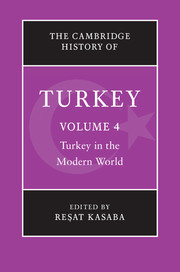Book contents
- Frontmatter
- 1 Introduction
- PART I OTTOMAN BACKGROUND AND TRANSITION
- PART II REPUBLIC OF TURKEY
- 7 Migration and Turkey: the dynamics of state, society and politics
- 8 The migration story of Turks in Germany: from the beginning to the end
- 9 Politics and political parties in Republican Turkey
- 10 Economic change in twentieth-century Turkey: is the glass more than half full?
- 11 Ideology, context and interest: the Turkish military
- 12 Kurds and the Turkish State
- 13 Islam and politics in contemporary Turkey
- 14 Sufism and Islamic groups in contemporary Turkey
- 15 Contestation and collaboration: women’s struggles for empowerment in Turkey
- 16 Art and architecture in modern Turkey: the Republican period
- 17 The novel in Turkish: narrative tradition to Nobel prize
- 18 A brief history of modern Istanbul
- Select bibliography
- Index
- References
11 - Ideology, context and interest: the Turkish military
from PART II - REPUBLIC OF TURKEY
Published online by Cambridge University Press: 28 November 2009
- Frontmatter
- 1 Introduction
- PART I OTTOMAN BACKGROUND AND TRANSITION
- PART II REPUBLIC OF TURKEY
- 7 Migration and Turkey: the dynamics of state, society and politics
- 8 The migration story of Turks in Germany: from the beginning to the end
- 9 Politics and political parties in Republican Turkey
- 10 Economic change in twentieth-century Turkey: is the glass more than half full?
- 11 Ideology, context and interest: the Turkish military
- 12 Kurds and the Turkish State
- 13 Islam and politics in contemporary Turkey
- 14 Sufism and Islamic groups in contemporary Turkey
- 15 Contestation and collaboration: women’s struggles for empowerment in Turkey
- 16 Art and architecture in modern Turkey: the Republican period
- 17 The novel in Turkish: narrative tradition to Nobel prize
- 18 A brief history of modern Istanbul
- Select bibliography
- Index
- References
Summary
Since the founding of the Turkish Republic, the Turkish Armed Forces (TAF) has enjoyed a pervasive sense of its own prerogative to watch over the regime it created and to transcend an exclusive focus on external defence. If the TAF’s confidence and ability to do so was not palpable during the years of single-party rule (1923–46), Turkey’s multi-party political system has since 1946 been characterised by the military’s capacity to control the fundamentals of the political agenda in its self-ordained role as guardian of the Republic. By internalising this role as a central ‘mission of belief’, the military has been able to interpret internal ‘political’ conflicts in the language of internal security threats, and reduce ‘national security’ to a military-dominated concept. On four occasions (1960, 1971, 1980 and 1997), the military intervened in and reshaped Turkish politics, although it always returned control to civilians after a short time. The fourth intervention, on 28 February 1997, marked a qualitative change, when the military-dominated National Security Council (Milli Güvenlik Kurulu, NSC) brought down a constitutionally elected coalition government headed by the Islamist Welfare Party (Refah Partisi, WP), thus altering the relationship between the military, the state and society. The process of change that the Justice and Development Party (Adalet ve Kalkinma Partisi, JDP) government has set in motion since its election victory in November 2002 in terms of curtailing the TAF’s political prerogatives and tutelage must also be understood within the context of a major shift in the regional and international power balance after the Iraqwar and the democratic reform requirements of the European Union (EU).
- Type
- Chapter
- Information
- The Cambridge History of Turkey , pp. 301 - 332Publisher: Cambridge University PressPrint publication year: 2008
References
- 11
- Cited by



